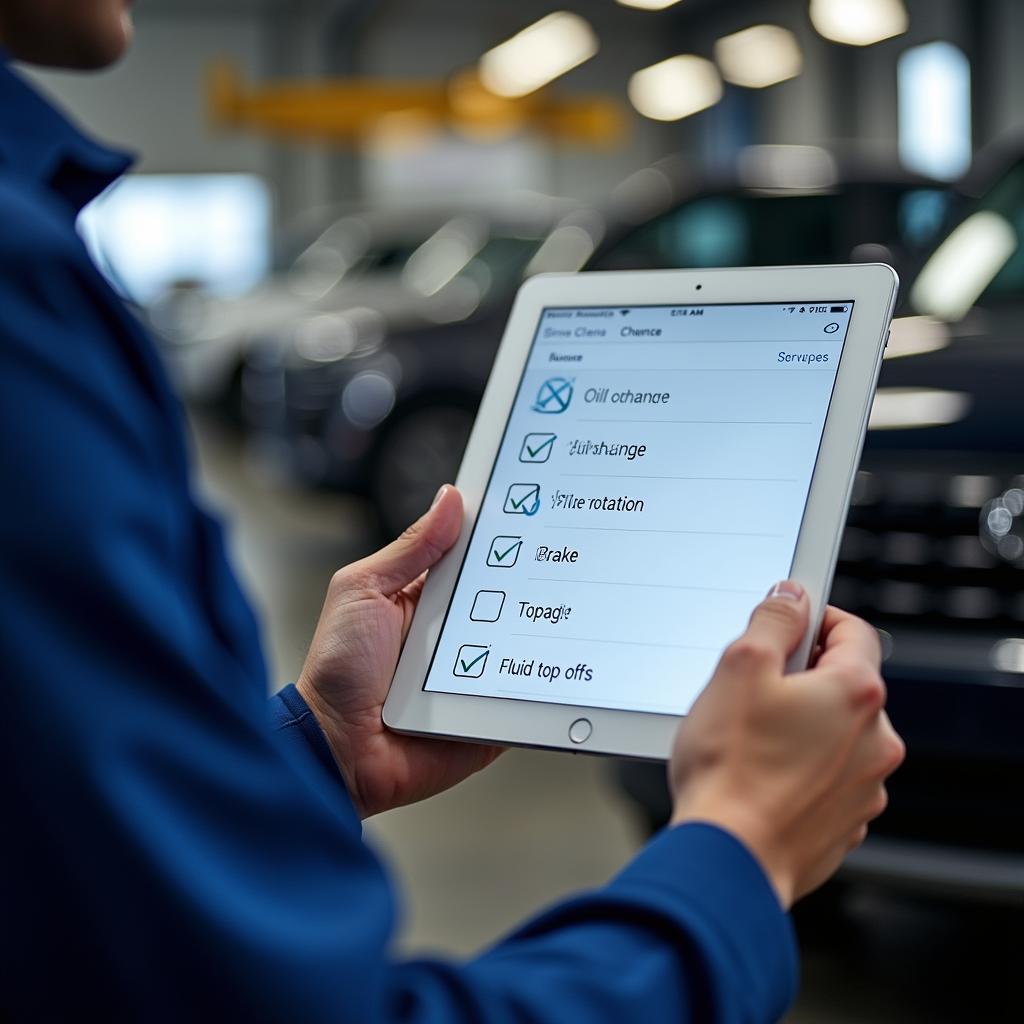Owning a Hyundai comes with the perk of their renowned reliability. But even the most dependable cars need regular servicing to stay in top shape. Taking your Hyundai for scheduled service appointments ensures it continues to deliver a smooth, safe, and efficient driving experience. But what exactly is done at a Hyundai car service? Let’s delve into the specifics.
Understanding Hyundai Service Intervals
Hyundai, like most car manufacturers, recommends a service schedule based on mileage and time. This is typically outlined in your owner’s manual. A standard schedule often involves:
- Oil and Filter Change: Usually every 3,000-5,000 miles or 6 months, this is the most frequent service task.
- Tire Rotation: Recommended every 5,000-7,500 miles to ensure even tire wear and prolong their lifespan.
- Brake Inspection: Regular inspections, often with every oil change, are crucial to spot wear and tear and ensure optimal braking performance.
- Fluid Checks: Essential fluids like coolant, brake fluid, power steering fluid, and windshield washer fluid are topped off or replaced as needed.
 Hyundai Service Checklist
Hyundai Service Checklist
A Closer Look at Key Service Milestones
Beyond the routine checks, specific service milestones address more comprehensive inspections and potential part replacements:
- 15,000-Mile Service: This typically involves an in-depth inspection of various systems, including belts, hoses, suspension, and exhaust.
- 30,000-Mile Service: Often includes replacing the air filter, cabin air filter, and spark plugs (for gasoline engines), along with a thorough inspection of brakes and suspension components.
- 60,000-Mile Service: This major service point may involve replacing the timing belt (for engines that use them) and other critical components.
It’s important to note that these are just general guidelines. The specific service needs of your Hyundai may vary based on your driving habits, climate, and model year.
The Importance of Using Genuine Hyundai Parts
When servicing your Hyundai, using genuine Hyundai parts is paramount. These parts are specifically designed and engineered for your vehicle, ensuring optimal performance, compatibility, and longevity.
Choosing the Right Service Provider
While you can take your Hyundai to any reputable mechanic, opting for a Hyundai dealership or authorized service center offers several benefits:
- Factory-Trained Technicians: These technicians possess specialized knowledge and expertise in servicing Hyundai vehicles.
- Specialized Diagnostic Equipment: Hyundai dealerships have access to advanced diagnostic tools specifically designed for Hyundai models.
- Genuine Hyundai Parts: You can rest assured that your car will be serviced using genuine Hyundai parts, maintaining its warranty and optimal performance.
“Having access to the latest software and technical bulletins from Hyundai is critical,” says Master Technician, James Kim, “It allows us to diagnose and repair issues efficiently and effectively.”
hyundai-car-service-center-near-velachery
Keeping Track of Service Records
Maintaining detailed service records is crucial for tracking your car’s maintenance history and identifying any potential issues. This documentation can also be helpful when selling your vehicle, demonstrating its service history to potential buyers.
how to check service records of hyundai car online
Conclusion
Regular servicing is the key to keeping your Hyundai running smoothly for years to come. By understanding what’s done at each service interval and choosing the right service provider, you can ensure optimal performance, reliability, and longevity from your Hyundai. Remember to consult your owner’s manual for specific service recommendations for your model and year.
what is the services of hyundai cars
FAQs about Hyundai Car Service
1. How often should I service my Hyundai?
Refer to your owner’s manual for specific recommendations. Generally, an oil change is recommended every 3,000-5,000 miles or every 6 months, whichever comes first. Other service intervals vary based on mileage and time.
2. What is the difference between a minor and major service?
A minor service typically includes an oil change, filter replacements, and a multi-point inspection. Major services are more comprehensive and involve inspecting or replacing key components like spark plugs, timing belts, and brake pads.
3. Can I service my Hyundai myself?
While some routine maintenance tasks can be performed at home, it’s generally recommended to have your Hyundai serviced by a qualified mechanic, especially for more complex procedures.
4. How much does a Hyundai service cost?
Service costs vary depending on the type of service, your car’s model, and the service provider. Contact a Hyundai dealership or authorized service center for a quote.
5. Is it essential to use genuine Hyundai parts?
Yes, using genuine Hyundai parts is highly recommended as they are designed to meet the specific requirements of your vehicle, ensuring optimal performance, compatibility, and longevity.
Need Assistance With Your Hyundai?
Contact our expert team via WhatsApp: +1(641)206-8880, Email: [email protected]. We’re available 24/7 to address your Hyundai service needs and answer any questions you may have.

